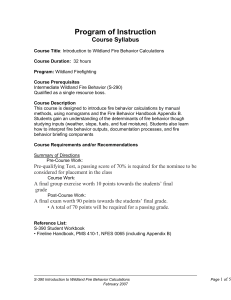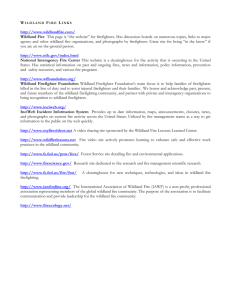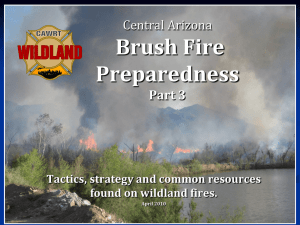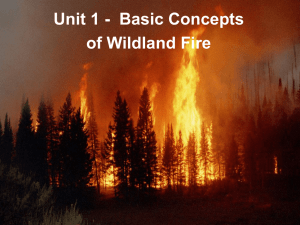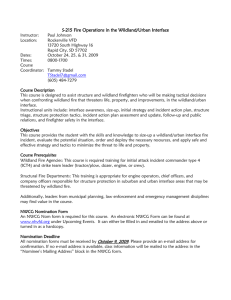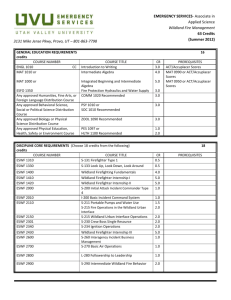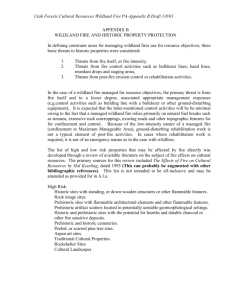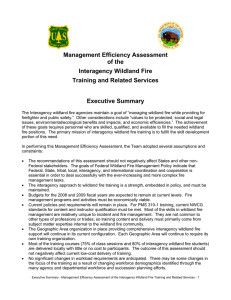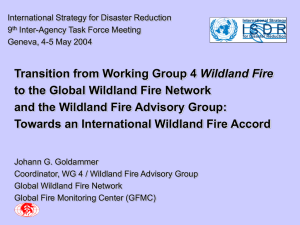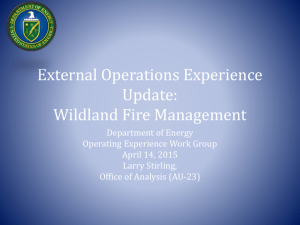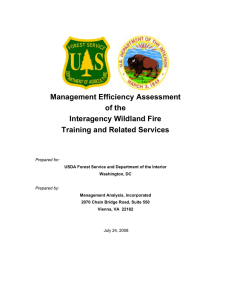Syllabus - S
advertisement
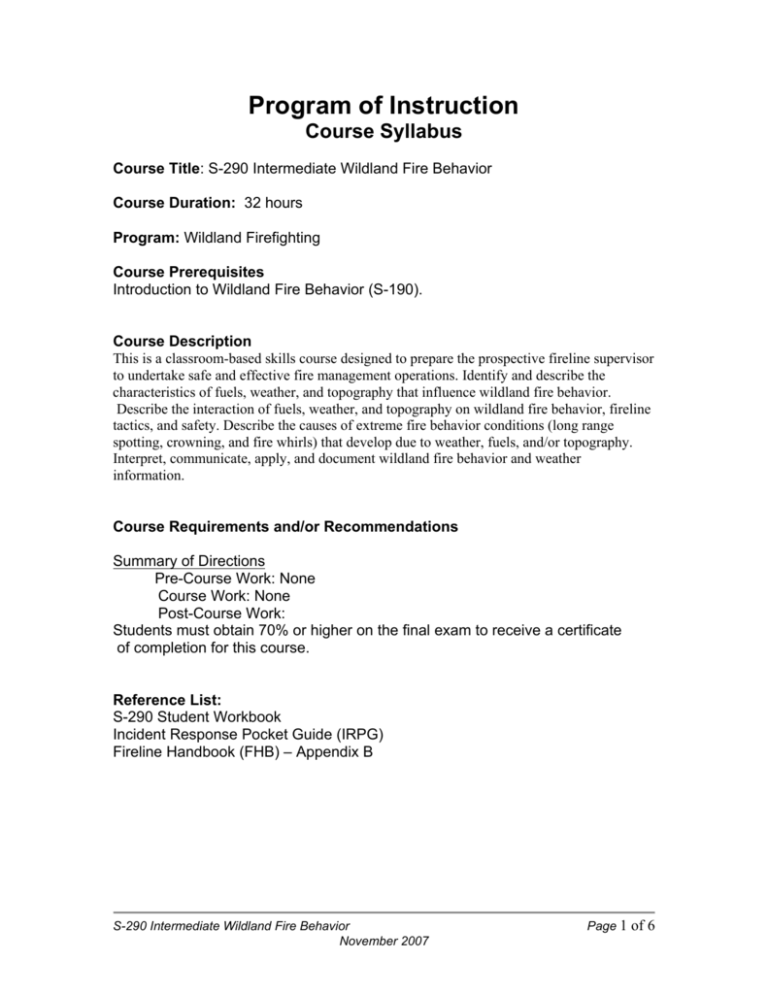
Program of Instruction Course Syllabus Course Title: S-290 Intermediate Wildland Fire Behavior Course Duration: 32 hours Program: Wildland Firefighting Course Prerequisites Introduction to Wildland Fire Behavior (S-190). Course Description This is a classroom-based skills course designed to prepare the prospective fireline supervisor to undertake safe and effective fire management operations. Identify and describe the characteristics of fuels, weather, and topography that influence wildland fire behavior. Describe the interaction of fuels, weather, and topography on wildland fire behavior, fireline tactics, and safety. Describe the causes of extreme fire behavior conditions (long range spotting, crowning, and fire whirls) that develop due to weather, fuels, and/or topography. Interpret, communicate, apply, and document wildland fire behavior and weather information. Course Requirements and/or Recommendations Summary of Directions Pre-Course Work: None Course Work: None Post-Course Work: Students must obtain 70% or higher on the final exam to receive a certificate of completion for this course. Reference List: S-290 Student Workbook Incident Response Pocket Guide (IRPG) Fireline Handbook (FHB) – Appendix B S-290 Intermediate Wildland Fire Behavior November 2007 Page 1 of 6 Course Policies: Attendance Policy: IFSI requires students to attend (100%) or make up all course content that leads to certification. Students are expected to attend on time and to remain in class for the duration of the course. Students MUST COMPLETE all portions of a certification course, both classroom and practical, to be eligible to receive their certification. If a student misses any portion of class with an accumulated absence of 20% or less of scheduled class time, it will be the student’s responsibility to arrange the make-up of the missed course content with the instructor(s) or program manager. The student must make up the specific course content that s/he missed, not just the hours. Make-ups are limited to 20% of scheduled class time. Make-ups must be documented on the class roster. If a student’s absence is greater than 20% refer to “True Emergences” section of the IFSI Examination Policy. Safety Policy: Students shall understand and follow all instructions pertaining to operational safety, as stated by instructors or as written in course materials. Instructors and students shall be mindful of safety at all times. Conduct judged to be unsafe shall be grounds for dismissal from the course. Academic Integrity Policy: IFSI has the responsibility for maintaining academic integrity so as to protect the quality of the education provided through its courses, and to protect those who depend upon our integrity. It is the responsibility of the student to refrain from infractions of academic integrity, from conduct that may lead to suspicion of such infractions, and from conduct that aids others in such infractions. Any violation of the code of conduct is grounds for immediate dismissal from the course. Grading Policy: Decisions regarding certificates of course completion shall be made solely by the lead instructor of the course. All grading of exams shall be conducted by the Curriculum/Testing Office. All grading of practical exercises shall be based upon the standards set by the regulatory agency referenced in the course material and IFSI. American Disabilities Act: As guaranteed in the Vocational Rehabilitation Act and in the American Disabilities Act, if any student needs special accommodations they are to notify their instructor and provide documentation as soon as possible so arrangements can be made to provide for the student’s needs. If arrangements cannot be made at the class site, the student will test at an alternative time and place where the special accommodations can be made. Evaluation Strategy: Example: Students will be evaluated with an end of course exam, and performance evaluation checklist. S-290 Intermediate Wildland Fire Behavior November 2007 Page 2 of 6 Course Content: Unit 0: Introduction Unit 1: The Fire Environment Unit 2: Topographic Influences on Wildland Fire Behavior Unit 3: Fuels Unit 4: Basic Weather Processes Unit 5: Temperature and Humidity Relationships Unit 6: Atmospheric Stability Unit 7: Wind Systems Unit 8: Keeping Current with the Weather Unit 9: Observing the Weather Unit10: Fuel Moisture Unit 11: Extreme Wildland Fire Behavior Unit 12: Gauging Fire Behavior and Guiding Fireline Decisions Final Exam S-290 Intermediate Wildland Fire Behavior November 2007 Page 3 of 6 Course Schedule DAY ONE Event Duration Unit 0 – Introduction Unit 1 – The Fire Environment Unit 2 –Topographic Influences on Wildland Fire Behavior 1 hour 1 hour 1 hour Lunch Unit 3 – Fuels 2 hours DAY TWO Event Duration Unit 4 – Basic Weather Processes Unit 5 - Temperature and Humidity Relationships 2 hours 2 hours Lunch Unit 6 - Atmospheric Stability S-290 Intermediate Wildland Fire Behavior November 2007 4 hours Page 4 of 6 DAY THREE Event Duration Unit 7 – Wind Systems 4 hours Lunch Unit 8 - Keeping Current with the Weather Unit 9 – Observing the Weather Unit 10 – Fuel Moisture 2 hours 1 hour 1 hour DAY FOUR Event Unit 10 – Fuel Moisture (cont.) Unit 11 – Extreme Wildland Fire Behavior Duration 2 hours 2 hours Lunch Unit 12 – Gauging Fire Behavior, Guiding Fireline Decisions S-290 Intermediate Wildland Fire Behavior November 2007 4 hours Page 5 of 6 DAY FOUR Event Duration Unit 12 – Gauging Fire Behavior, Guiding Fireline Decisions (cont.) 2 hours Lunch Final Exam S-290 Intermediate Wildland Fire Behavior November 2007 1 hour Page 6 of 6
